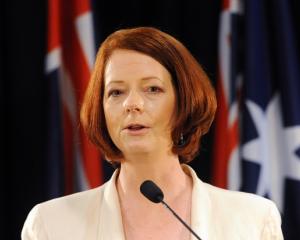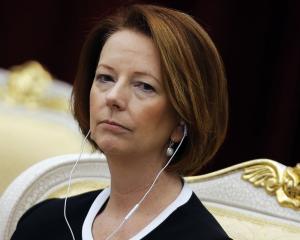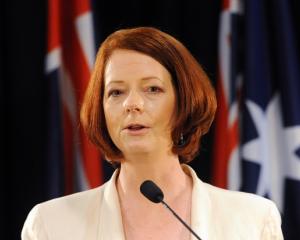The Australian election campaign, which was robustly - brutally, some might say - signalled when Julia Gillard toppled Kevin Rudd as Prime Minister, got under way proper last Saturday when she announced the poll would be held on August 21.
For all that, there has been a certain muted sense of occasion about it as the two leaders began the week warily addressing the voting public with lukewarm rhetoric and mundane manifestos.
Ms Gillard and opposition leader Tony Abbott traded not so much intemperate volleys as considered forehand shots from the back of the political court.
Like a couple of baseline players returning serve on well-travelled turf, each desperate not to be the first to mis-hit, the contenders seemed intent on underwhelming the electorate with status-quo platitudes rather than electrifying it with fresh ideas and coherent vision.
For what vision there appears to be in the shape of both campaigns to date is that of the "focus group" - playing to the carefully polled preferences of the public.
Writing in Melbourne newspaper The Age, political columnist Peter Hartcher described the face-off as the "politics of the lowest common denominator"; and the leadership style embodied by both candidates as akin to that described by 19th-century French democrat Alexandre Auguste Ledru-Rollin thus: "There go the people - I must follow them, for I am their leader."
Ms Gillard has been forthright and repetitive - almost mantra-like - in insisting that Australia should be "moving forward" but inexplicably tongue-tied in terms of the specifics of a programme to achieve this.
Challenged on her credentials, her record, or on anything other than having been former prime minister Kevin Rudd's deputy, she has pointed to her swift action on the mining tax - over which she has retreated from the Rudd government position - made noises on the contentious issue of population growth and supporting a "sustainable Australia", and talked tough, but again not specifically following the East Timor embarrassment, on border control and boat people.
In the early days of the campaign, Mr Abbott has found himself fending off charges that a Liberal/National coalition would reintroduce aspects of John Howard's unpopular WorkChoices legislation, to the extent that on Monday this week he found himself signing a declaration presented by a radio host that his party would not be touching Labor's replacement 2009 Fair Work Act.
No sooner had he said it than he was partly undermined by his own industrial relations spokesman who suggested it could indeed be tweaked.
Mr Abbott has also attempted to land blows on Ms Gillard's credibility as Prime Minister, and her trustworthiness: "Why should people trust Julia Gillard when even Kevin Rudd couldn't?" Notwithstanding the fact that while the party preferences are within reach, and Ms Gillard's personal popularity outstrips that of Mr Abbott, he has a point.
It is one that may not be entirely lost on voters in Queensland, whence Mr Rudd hails and where it looks likely the election will be won and lost - with a significant number of marginal seats in the balance. And to this extent, her predecessor hangs over Ms Gillard not unlike Banquo's ghost.
Whether out of twinges of guilt or simply political pragmatism, she has promised to offer Mr Rudd a senior ministry should she win the election, but will not be drawn on his role in the meantime - largely, it must be construed, to avoid contamination of the combination of personal foible and political faux pas that saw such a dramatic collapse in the former leader's personal popularity.
Apart from mining taxes, border integrity and immigration, the major issues of the election will be the economy, carbon emissions, telecommunications, health and education.
Ms Gillard and her strategy team will endeavour in all these areas to goad the gaffe-prone opposition leader into a familiar pose: one that reunites his foot with his mouth at regular intervals. Not that the Prime Minister can afford to be smug.
Already there are those portraying her as a cool, childless, atheist who has little in common with the average Australian - a tactic that eventually paid off for opponents of New Zealand's long-standing prime minster Helen Clark.
And however much she repeats her belief in hard work, respect and education, it may not be enough.
In the end, lest they dull the electorate into a stalemate of listless ennui, both leaders might have to take their gloves off and depart from their respective research departments' scripts. Only then might the campaign truly come alive - and offer voters an unadorned glimpse of for whom, and what, they are voting.






